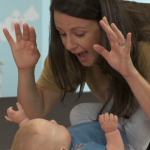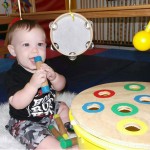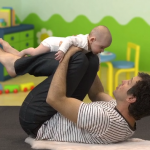Join the thousands of parents already raising smarter, happier babies with our online baby classes: The Active Babies Smart Kids series. Click here.
GymbaROO-KindyROO kids are excelling academically, emotionally, in leadership roles and on the sporting field. Find us at: GymbaROO-KindyROO
As you will be well aware, music and raising parental awareness of the importance of music to childhood development has always played an important and large role in our GymbaROO and KindyROO programs. Exciting advances in science and technology are now able to directly confirm the enormous amount of activity that is going inside those little developing brains when exposed to and involved with music. Dr Anita Collins (PhD) is at the forefront of this research. Her recent TEDx talk on the subject has received millions of views. We are delighted to bring you the following article from Dr Collins.
How do babies and children use music to learn?
Dr Anita Collins
At birth, babies are not able to turn themselves over or control their limbs, they can only see vague shapes and some colours and even babies’ sense of smell is not highly developed. But their ears work perfectly. Neuroscientists have found that our capacity to hear and process sound is actually our first way of understanding the world. And not only is it the first, it appears to be of prime importance.
 Babies use their music processing network, which is actually their auditory processing network, to begin to understand the world from the moment they are born. In fact, babies hear speech as music and use their music processing networks to understand their mother and father’s voices. They hear the melody of their voices, if they are happy, or tired or excited or restful, and they apply meaning to that melody. Thus they get to know their parents and caregivers as individual human beings; they can identify them by their voice, in a similar way to the way a parent can identify what a baby wants just by the different pitches and inflections in their cries.
Babies use their music processing network, which is actually their auditory processing network, to begin to understand the world from the moment they are born. In fact, babies hear speech as music and use their music processing networks to understand their mother and father’s voices. They hear the melody of their voices, if they are happy, or tired or excited or restful, and they apply meaning to that melody. Thus they get to know their parents and caregivers as individual human beings; they can identify them by their voice, in a similar way to the way a parent can identify what a baby wants just by the different pitches and inflections in their cries.
The auditory processing network continues to work very hard in the first few years of a child’s life and neuroscientists have found that this network is the key player as children develop speech. In order to develop speech, children need to be able to distinguish between what is the noise of the washing machine and what is speech. After they do this they then need to distinguish the parts of speech, the concepts of words, the underlying emotions and intentions of speech, and how speech is constructed to form meaning. Neuroscientists have found that this auditory processing is happening long before children begin to use speech in any recognisable way.
 So what does this have to do with music? As it turns out, quite a lot. Music as an art form is unique to human beings, and neuroscientists have been wondering what the evolutionary purpose of music might be. It appears that we as human beings, create and enjoy music because it is a basic learning tool for the brain, the brain’s first ‘how to’ manual.
So what does this have to do with music? As it turns out, quite a lot. Music as an art form is unique to human beings, and neuroscientists have been wondering what the evolutionary purpose of music might be. It appears that we as human beings, create and enjoy music because it is a basic learning tool for the brain, the brain’s first ‘how to’ manual.
One of the most important developmental stages for a child is to be able to communicate, and neuroscientists have found that hearing, repeating and making rhythm and melody teaches the brain how to communicate. It connects the necessary neural pathways the children need in order to then begin to speak. Music is the primer for verbal communication in humans.
It is not just a ‘how to’ manual for speech and language, it also helps the brain to teach the body how to move. When music comes on the stereo in the supermarket, especially music with a consistent and heavy beat, babies and young children can be seen bobbing up and down and doing the cutest uncoordinated dances. Interestingly though, as parents we think it is adorable, and it is, but what we might not know is that they are using the beat in the music to teach their limbs how to move with control and with purpose.
 Even beyond learning language and movement, the music processing network is the primary source of categorisation for babies and young children. Babies and children love new sounds, and while they are sorting through what is noise and speech, which voice is their mother’s and what the tone of their father’s voice might mean, they are also categorising their world. They are soaking up every sound they hear and putting it in their brain’s memory banks, to which they then add visual categories and movement categories as these two areas develop.
Even beyond learning language and movement, the music processing network is the primary source of categorisation for babies and young children. Babies and children love new sounds, and while they are sorting through what is noise and speech, which voice is their mother’s and what the tone of their father’s voice might mean, they are also categorising their world. They are soaking up every sound they hear and putting it in their brain’s memory banks, to which they then add visual categories and movement categories as these two areas develop.
So with so much riding on the development of the auditory processing network from birth, how can music help? Funnily enough, it is many of the simplest things that we can do every day that can make an enormous difference to a child’s auditory processing development. Here are some ideas.
Helping to develop speech and language
- Vary your voice – talk to a baby using the full range of your voice, high and low sounds, and mimic them with your hand movements when you talk.
- Play with vocal sounds –repeating what baby says to you and visa versa. You can get a real conversation going.
Helping to develop movement and coordination
- Read stories with a beat – take care to emphasise the beat of the words when you read stories.
- Clapping hands – help baby to clap in time to the beat of music or speech.
- Keeping the beat – encourage baby to keep a steady beat using any toy or object.
Helping to understand and categorise their world
- Locate sounds – get baby to locate different sounds from multiple directions.
- Identify sound sources – put two sound making objects behind your back, play them, reveal them to baby and encourage them to identify the object that made the sound.
Using music and movement to help babies and young children supercharge their brain development is as simple as understanding that music in the form of all sounds, is around us all the time. Music is the mechanism that our brains have created to help our brains grow and thrive. Music is a superfood for the growing brain.
Dr Anita Collins (PhD) is the assistant Professor of Music and Arts Education Faculty of Education, Science, Technology and Mathematics University of Canberra. Find out more here: anitacollinsmusic.com
GymbaROO-KindyROO
Thousands of parents, babies and children are presently involved in our programs and creating rising stars. GymbaROO-KindyROO kids are excelling academically, emotionally, in leadership roles and on the sporting field. Come join all the fun and learning! “GymbaROO – The best decision I ever made for my child.” Classes from 6 weeks old – 7 years GymbaROO KindyROO
Active Babies Smart Kids – Online Baby Classes
GymbaROO-KindyROO’s online series of baby classes is taking the parenting world by storm! It is highly recommended by doctors, paediatricians, early childhood experts and the Maternal Child and Family Health Nurses Association. This series is being called: “The essential guide for parents”. Join the thousands of parents already playing with their babies from birth, in the best way for brain and body development and laying crucial foundations for future learning. What happens in the first year, not only matters, it matters a lot! See Introductory video below.
Active Babies Smart Kids online series – Click here.
Try the first class FREE! Click here to watch our Active Babies Smart Kids Episode 1 – Tummy Time
Enjoy the following GymbaROO-KindyROO articles
GymbaROO-KindyROO: Who, what, where, why and how
All about GymbaROO-KindyROO’s online baby classes for parents and babies: Active Babies Smart Kids
How to raise a smarter, happier baby
Why active babies make smart kids
Become a GymbaROO-KindyROO franchisee
Music and your child’s developing brain: Research news.
My baby’s got rhythm. Musical activities to share with your baby.
Learning to keep the beat helps your child socially.
The benefits of dancing with your baby.
Sing, talk and dance during pregnancy: It boosts your baby’s brain growth.


